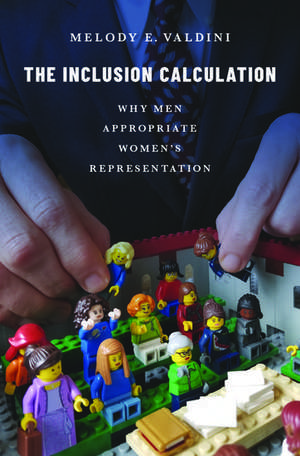The Inclusion Calculation: Why Men Appropriate Women's Representation
Autor Melody E. Valdinien Limba Engleză Hardback – 10 oct 2019
| Toate formatele și edițiile | Preț | Express |
|---|---|---|
| Paperback (1) | 342.32 lei 3-5 săpt. | |
| Oxford University Press – 10 oct 2019 | 342.32 lei 3-5 săpt. | |
| Hardback (1) | 585.00 lei 31-37 zile | |
| Oxford University Press – 10 oct 2019 | 585.00 lei 31-37 zile |
Preț: 585.00 lei
Preț vechi: 781.24 lei
-25% Nou
Puncte Express: 878
Preț estimativ în valută:
111.99€ • 115.18$ • 92.91£
111.99€ • 115.18$ • 92.91£
Carte tipărită la comandă
Livrare economică 07-13 februarie
Preluare comenzi: 021 569.72.76
Specificații
ISBN-13: 9780190936198
ISBN-10: 0190936193
Pagini: 208
Dimensiuni: 236 x 157 x 18 mm
Greutate: 0.43 kg
Editura: Oxford University Press
Colecția OUP USA
Locul publicării:New York, United States
ISBN-10: 0190936193
Pagini: 208
Dimensiuni: 236 x 157 x 18 mm
Greutate: 0.43 kg
Editura: Oxford University Press
Colecția OUP USA
Locul publicării:New York, United States
Recenzii
The Inclusion Calculation cleverly flips the script on previous research analyzing women's descriptive representation. ... [It] makes a superb contribution to comparative politics.
This volume makes use of several systematic statistical analyses and numerous case studies to explore the nuances that help to explain the calculations gatekeepers make. Valdini's provocative framework should spark a reconsideration of implicit assumptions about women's representation and how to ensure that governments provide authentic and meaningful representation for all members of society.
Rather than the oft-asked question of how women make strides on politics, this excellent book flips this question on its head by asking when and why established political elites let women in? The argument is compelling: politicians allow women into elected positions when it benefits their own electoral fortunes. The analyses draw on an impressive array of case studies and sources of evidence.
This pathbreaking book brings patriarchy back into gender and politics research. Valdini rightly argues that male elites do not nominate women because they have good intentions. Rather, certain moments make the benefits of women's inclusion outweigh the threat to men's power. Using quantitative analyses and case studies, Valdini identifies two such moments: after corruption crises and in decaying democracies. The focus on elites' inclusion calculation provides a timely reminder that the responsibility for women's political underrepresentation lies with men.
Valdini offers a brilliant new analysis of gender representation, focusing not on women's efforts to gain access to politics but on men's role as gatekeepers. She provides a ground-breaking contribution, asking 'when and why do men let the women in?' and arguing that male elites facilitate women's descriptive representation when it is likely to generate tangible benefits to men's power. Valdini's approach is original, smart, compelling, and highly readable. A must-read for all scholars and students of gender politics!
This volume makes use of several systematic statistical analyses and numerous case studies to explore the nuances that help to explain the calculations gatekeepers make. Valdini's provocative framework should spark a reconsideration of implicit assumptions about women's representation and how to ensure that governments provide authentic and meaningful representation for all members of society.
Rather than the oft-asked question of how women make strides on politics, this excellent book flips this question on its head by asking when and why established political elites let women in? The argument is compelling: politicians allow women into elected positions when it benefits their own electoral fortunes. The analyses draw on an impressive array of case studies and sources of evidence.
This pathbreaking book brings patriarchy back into gender and politics research. Valdini rightly argues that male elites do not nominate women because they have good intentions. Rather, certain moments make the benefits of women's inclusion outweigh the threat to men's power. Using quantitative analyses and case studies, Valdini identifies two such moments: after corruption crises and in decaying democracies. The focus on elites' inclusion calculation provides a timely reminder that the responsibility for women's political underrepresentation lies with men.
Valdini offers a brilliant new analysis of gender representation, focusing not on women's efforts to gain access to politics but on men's role as gatekeepers. She provides a ground-breaking contribution, asking 'when and why do men let the women in?' and arguing that male elites facilitate women's descriptive representation when it is likely to generate tangible benefits to men's power. Valdini's approach is original, smart, compelling, and highly readable. A must-read for all scholars and students of gender politics!
Notă biografică
Melody E. Valdini is Associate Professor of Political Science at Portland State University, the Associate Editor of the Journal of Women, Politics & Policy, and the 2017-2019 chair of the Representation and Electoral Systems section of the American Political Science Association. Her research focuses on the consequences of institutional design, with a particular focus on electoral systems, political parties, and women's descriptive representation. She has published in the American Journal of Political Science, Political Research Quarterly, Electoral Studies, and Politics & Gender, and won the Carrie Chapman Catt Prize in 2012. She is co-author of The Character of Democracy: How Institutions Shape Politics.
